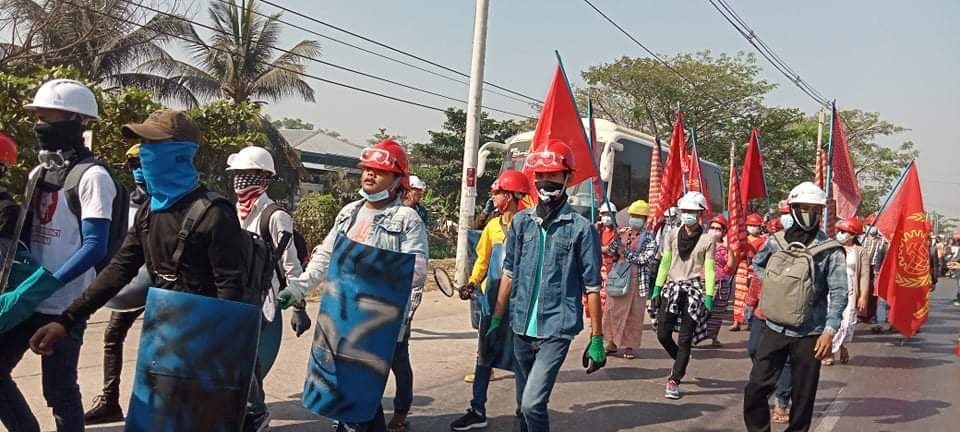
Mar 19, 2021
At least two union members were confirmed killed by the Myanmar military this week and at least six workers were shot dead at the Xing Jia shoe factory in the Hlaing Thar Yar industrial zone Tuesday, according to union leaders. The factory workers, including the woman leader, were shot after the employer called the police when they demanded unpaid wages. Seventy workers were arrested and loaded onto two prisoner trucks.
Union leaders say the police and military violence against protesters in the industrial zones is much worse than is being reported because nationwide internet service repeatedly has been cut, including on Sunday before a violent crackdown.
Also this week, one union leader from the Federation of General Workers Myanmar (FGWM) was arrested while walking to the FGWM office but was released later that night.
Workers Targeted for Standing Up for Democracy
Workers, especially women, have taken a leading role in the civil disobedience movement (CDM) that began February 1, following the military ouster of elected officials, including leader Aung San Suu Kyi. At least 217 people have been killed.
Garment workers, led by women union leaders, have demanded global corporate fashion brands tell factory owners to respect workers’ rights, including the freedom to freely express themselves and peacefully gather.
The Confederation of Trade Unions-Myanmar (CTUM) is requesting international financial institutions freeze all activities in Myanmar, saying all activities with government ministries translate as support for the coup. The CTUM also is calling on companies to protect and respect freedom of association and the rights to assemble and peacefully protest and must help ensure that no worker or union leader will be punished for joining the CDM.
The military is now targeting workers on several fronts, moving into industrial zones and declaring martial law. The military also issued a public statement that public-sector workers must return to work by Monday or they will be criminally charged.
Nearly all factories in the Yangon area, including in major industrial zones, have closed, and union leaders report a mass exodus of factory workers from the industrial zones to their hometown rural villages.
The military is asking factory owners to disclose the names and addresses of trade union leaders to arrest them, and soldiers are going door to door in the worker dormitories and hostels in a bid to find them, according to Khaing Zar Aung, president of the Industrial Workers Federation of Myanmar (IWFM).
Key union leaders of CTUM and affiliated unions were forced into hiding after the military issued a secret list of 27 trade union leaders to be persecute, she writes.
The global labor movement has condemned the military coup, including the International Trade Union Confederation, AFL-CIO and IndustriALL, which called for the immediate restoration of democracy.
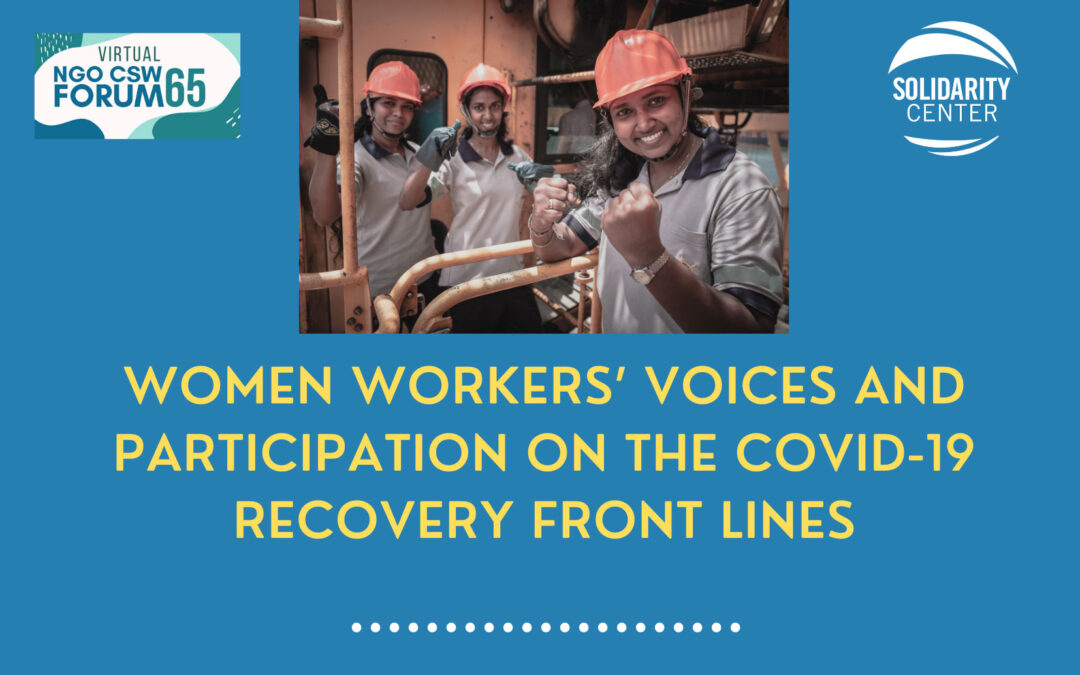
Mar 17, 2021
The COVID-19 pandemic has hit workers hard—but women have especially suffered compared with men, experiencing higher rates of unemployment, discrimination and exposure to the virus, and skyrocketing rates of gender-based violence and harassment (GBVH), speakers said this week at a Solidarity Center panel. Unions are organizing to demand that government responses to the pandemic’s economic and social effects center on the needs and experiences of women workers, ensuring safety and respect for all workers.
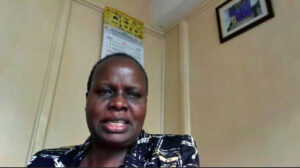
“Women have suffered because most of the work they do is precarious”—Rose Omamo, Kenya
“Women have suffered because most of the work they do is precarious—they are informal workers, frontline workers,” said Rose Omamo, general secretary of the Amalgamated Union of Kenya Metalworkers. Omamo explained how COVID-19 has shown the need to extend social protections like paid sick leave and health care to all workers, and to address issues affecting women in Kenya and worldwide. She shared that rape and sexual assault in the world of work has increased because of economic stress caused by the pandemic, including an increase in domestic violence and increased demands for sexual favors in order to obtain or keep a job. Kenyan unions are organizing to demand that social protections include access to reproductive health services in light of increased sexual violence, and are bargaining with employers to increase protections against GBVH in the workplace.
Omamo was among five women union leaders and Solidarity Center partners who took part in “Women Workers’ Voices and Participation on the COVID-19 Recovery Front Lines,” a virtual parallel event during the United Nations Commission on the Status of Women (CSW) as part of the NGO CSW65 Virtual Forum.
Employers, Government Failing Women Workers in the Pandemic
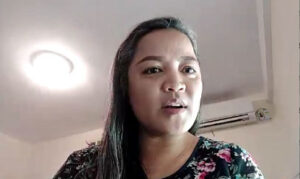
Employers have used COVID-19 as an excuse to violate worker rights, says Cambodian union leader Ou Tepphallin.
Employers have taken advantage of the pandemic to exploit, abuse and lay off workers, panelists said. “Labor rights have been violated during COVID-19 as employers used the opportunity to exploit the system,” said Ou Tepphallin, president of the Cambodian Food and Service Workers Federation.
Retail, hospitality and garment workers in Cambodia, the majority of whom are women, have not been provided adequate personal protective equipment (PPE) or measures to ensure their safety, and unscrupulous employers have taken advantage of the crisis to exploit and abuse workers. For example, workers in the hospitality sector report that entertainment venues have opened illegally during lockdown and forced workers to return to work. Some companies deliberately targeted older or less conventionally attractive workers for layoffs. Unions have been organizing to hold employers to account, negotiating for better protection measures, including protections from GBVH.

When women are in unions, they can speak out against mistreatment and come together to create solutions, says Honduran union leader Iris Munguia.
In Honduras, the impact of the pandemic collided with ecological and social crises. The devastation caused by two hurricanes in November 2020 left many women homeless and struggling to support their families, said Iris Munguía, women’s coordinator of the Honduran Federation of Agro-industrial Unions (FESTAGRO). In addition, women experience extremely high rates of GBVH, which is treated with impunity in Honduras. More than 30 women have been murdered in 2021, and “there are no investigations of these murders,” Munguia said.
The combined crises have left women workers more vulnerable than ever to exploitation and abuse. The majority of workers laid off during the pandemic were women, and unions have been organizing to ensure women workers are at the bargaining table to win protections from employers, including access to childcare, adequate protective equipment and protections against GBVH at work. Unions in the agricultural sector are demanding that multinational companies do more to ensure greater safety on the job. Munguia discussed the power of union organizing, stressing that women in trade unions had the ability to speak out against mistreatment and come together to create solutions.
In Honduras, Munguía is part of a campaign for C190 ratification, while also training women to be part of negotiations with employers so they can advocate for contract clauses that benefit them, such as childcare and a violence-free workplace.
“We have a great advantage by being unionized,” she said. “Whenever we face discrimination, harassment, we can report it, denounce it, talk about it—and that opportunity is there because we are part of a union.”
‘We Have a Great Advantage: We Are in a Union’
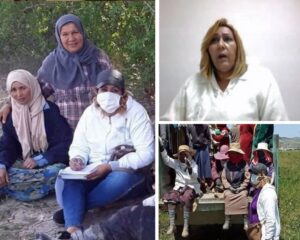
UGTT’s Nadia Bergaoui shared images of women agricultural workers as she discussed the challenges they face at work.
In the face of such challenges, women have stepped up their efforts to achieve justice at the workplace, according to the panelists, including efforts to push their governments to ratify Convention 190. Adopted by the International Labor Organization in 2019, the convention seeks to end violence and harassment in the world of work, including gender-based violence.
Across Tunisia, where 500,000 women work in the informal agricultural sector, the Federation of Agriculture and the Tunisian General Labor Union (UGTT) are working to end gender-based violence through awareness-raising programs that ensure women know their rights on the job and can speak out for safe conditions, especially on the dangerous transport to and from work, said Nadia Bergaoui.
Bergaoui, general secretary, media officer and women’s affairs officer of the Federation of Agriculture, said a union survey in 2020 found that more than half of women said they have faced verbal or physical abuse on the job, and lack access to paid time off, sick leave or health care. The union is organizing workers to demand safe transportation, protections against GBVH, PPE and access to social protections.
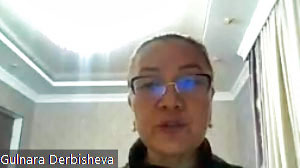
Unions in Kyrgyzstan are advocating for protections for women workers, says Gulnara Derbisheva.
Gulnara Derbisheva, director of Insan Leilek, discussed how unions in Kyrgyzstan are advocating for protections for women workers, including demanding that the government address the increase in GBVH during the pandemic by ratifying Convention 190. Unions, with Solidarity Center support, opened a women migrant worker center in Bishkek, where workers have reported increases in GBVH and other abuse on the job. She shared how she is working with unions to advocate for greater protections for women migrant workers, including ratification of C190.
“Unless we keep advocating, we will be in a standstill,” she said.
Watch a recording of the event, simultaneously translated for Arabic, English, Khmer, Russian and Spanish speakers.

Mar 10, 2021
“Violence and harassment happens to all workers, irrespective of your gender,” says Brenda Modise, a union activist in South Africa. “It doesn’t matter whether they are men and women, old young LGBTQI community or anyone, but we are addressing violence and harassment in the world of work against all workers.”
Modise spoke with Solidarity Center Executive Director Shawna Bader-Blau in first episode of The Solidarity Center Podcast, “Billions of Us, One Just Future,” which highlights conversations with workers (and other smart people) worldwide shaping the workplace for the better.
(Join us for a new episode each Wednesday at iTunes, Spotify, Amazon, Stitcher or wherever you listen to your podcasts. )
Front-line Leaders Building a Future Inclusive of All Workers
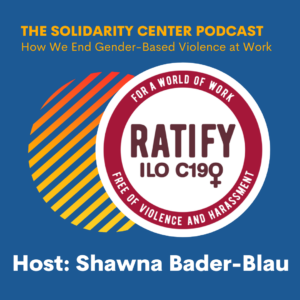 The Solidarity Center Podcast’s seven-episode season will feature worker advocates from around the world:
The Solidarity Center Podcast’s seven-episode season will feature worker advocates from around the world:
- Maximiliano Garcez, a labor rights lawyer who describes workers’ efforts to seek justice following a deadly mining accident in Brazil.
- Adriana Paz, an advocate with the International Domestic Workers Federation who understands firsthand the power of unions in ensuring domestic workers have safe, decent jobs.
- International Trade Union Confederation President Ayuba Wabba, who explores the Nigerian labor movement’s response to the COVID crisis on workers, and discusses the global labor movement’s plans to build back better for workers around the world.
- Preeda, a migrant worker rights activist in Thailand working with unions to help migrant workers meet the challenges of COVID-19.
- Sergey Antusevich, a brave union leader in Belarus working for democratic freedom in a repressive regime.
- Francia Blanco, a domestic worker and trans rights activist reaching marginalized workers through her all-trans domestic workers union.
These front-line leaders will share the steps they are taking to shape their livelihoods at the workplace and in their communities in the face of escalating attacks on democracy and civil rights, and explore how they seek to build a more equitable future, one inclusive of all workers as the COVID-19 pandemic upends structures, systems and societies.
‘Tears of Joy’
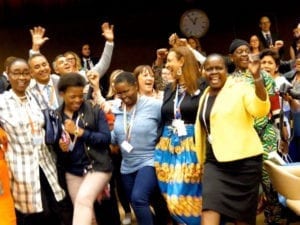
Union activists celebrate after the ILO adopts Convention 190 to end gender-based violence at work. Credit: ITUC
In the first episode, Modise shares how she and women unionists around the world campaigned for adoption of an International Labor Organization convention (regulation) on ending gender-based violence and harassment in the world of work, and how they are moving forward the campaign by pushing their governments to ratify Convention 190.
“We need to put more effort as the women in South Africa to make sure that whatever that you have were fought for is going to be realized in South Africa and be incorporated into our own legislation and make sure that it is implemented. We should not only have beautiful legislation, but we should have implementable legislation that we can be able to monitor and evaluate.”
As Modise heard an audio clip of women unionists singing and clapping the moment Convention 190 was adopted in 2019, she reflected on her experience.
“It was a breathtaking moment. We all shed tears. It was tears of joy because remember, when you went into that room as workers of the world, we knew what we wanted, but we didn’t know if the business constituents of the world understand where we are coming from.
“It really feels great, even though the bigger work has not yet started. We really want South Africa to ratify the convention. The work is not going to be ending at ratification. It’s also going to go in terms of after ratification, what next, and that’s where the bigger role and our activism is going to be needed.”
This podcast was made possible by the generous support of the American people through the U.S. Agency for International Development (USAID) under Cooperative Agreement No.AID-OAA-L-16-00001 and the opinions expressed herein are those of the participant(s) and do not necessarily reflect the views of USAID/USG.
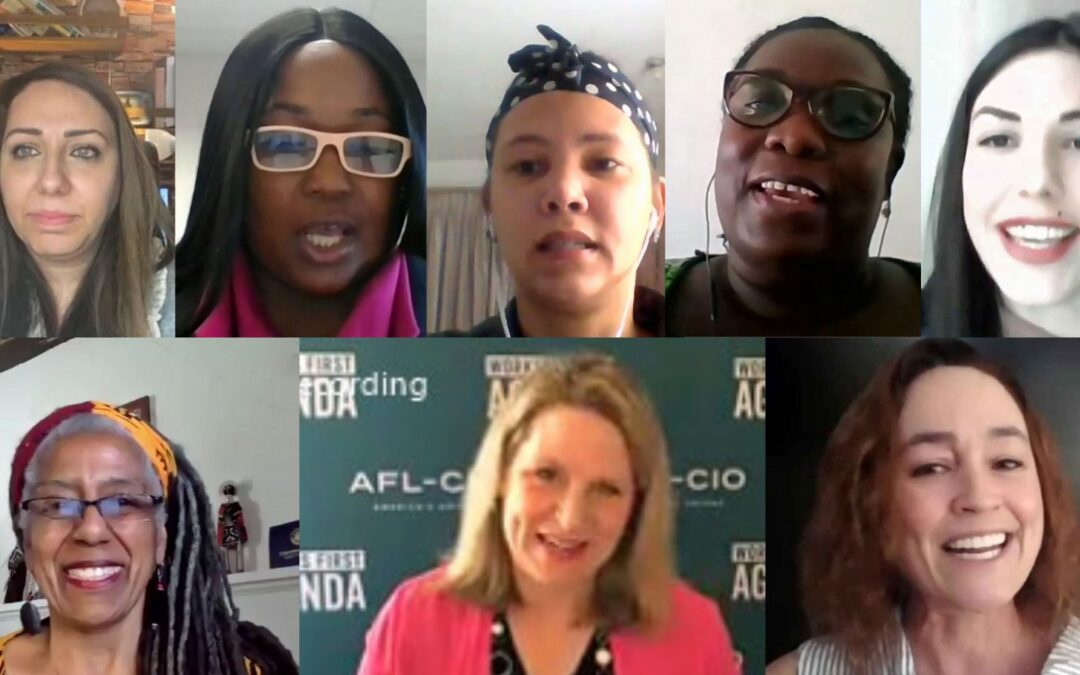
Mar 8, 2021
Women are undervalued, underpaid and the target of disparaging stereotypes and even violence—but by joining together in unions, they stand strong with a collective voice to change the workplace, society and government, women union leaders said today in a panel event.
“Women are carrying the burden. But we are not remaining silent,” said AFL-CIO Secretary Treasurer Liz Shuler, in opening remarks. “We are claiming our power through our union. It’s one of the most important stories in the world. It is about our collective power.”
Marking International Women’s Day, March 8, the panel, “Ever Essential: Women’s Work Is the Backbone of the Global Economy,” featured leaders from Colombia, Ghana, Palestine and the United States who shared their experiences defending the rights of women workers to equality, good jobs and an end to violence and abuse. Nearly 200 participants joined the virtual panel, sponsored by the Solidarity Center and the U.S.-based Coalition of Labor Union Women (CLUW).
CLUW President Elise Bryant launched the event with a song and a salute to “SNAP”: Sisters Not Afraid of Power. “The rest of the world has finally figured out what we always knew: Women’s work is essential. Period,” she said.
Gaining a Place in Union Leadership, Government
“Women’s work is underpaid even though the work they do makes society function,” said Philadelphia CLUW President Koren M. Parker, adding that globally, women work 4.5 unpaid hours a day compared with slightly more than two hours a day for men.
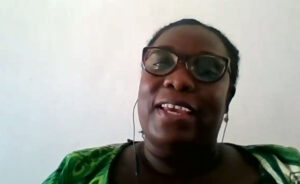
Emelia Ghansah recounted her rise in union leadership despite the obstacles she faces as a woman. Credit: Solidarity Center
Women’s struggles to gain their rightful place in leadership and decision-making positions also includes unions, said Emelia Ghansah, the training and education leader at the General Agricultural Workers’ Union of Ghana (GAWU).
“Even though we are the majority, our voice does not reach the top,” she said. While women work to elect men to leadership positions, support for women who seek high office “is never reciprocated by men.”
Ghansah, who described how she rose from a program officer to her current position despite obstacles to women’s union participation like lack of child care, recently worked with street vendors, primarily women, helping organizing them to work collectively and accompanying them as they met with local authorities to negotiate for a new market building, now underway.
In Palestine, Sanaa Alsarghali from the nongovernmental organization Women, Media and Development, shared how she is talking with university students, working women and other groups to gain support for ensuring women are included in process to draft a new constitution, one that addresses gender-based violence and ensure gender equality.
‘Only Our Collective Power Could Win’
In Colombia, Carolina Del Valle Hevia de Brandts led the formation of a union representing more than 1,000 Colombian and Venezuelan workers delivering food from restaurants and grocery stores to homes.
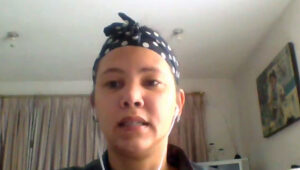
Carolina Del Valle Hevia de Brandts founded a union for food delivery drivers in Colombia. Credit: Solidarity Center
While digital platforms like food delivery and ride sharing “have amassed a lot of money during the pandemic all over the world,” workers, especially women, have few rights and are vulnerable to abuse, said Hevia. “Women face sexual harassment, violent threats and all kinds of behavior just because we are working the public space and streets [that] are our working environment,” she said.
A refugee from Venezuela, Hevia described how women migrant workers are doubly targeted because of ethnic stereotypes. Yet by joining together in the Union of Platform Workers (UNIDAPP), Hevia said she and other union members are “defenders of people’s rights so we can become a better society with no distinction of race or gender.”
“When we unite, we are invincible!”
In a rousing close, Solidarity Center Executive Director Shawna Bader-Blau said the panel provided women with inspiration and energy to go forward.
“When we get tired, we can still be inspired. Let’s carry the truth that we are stronger together.
When women workers’ win, everybody wins. When women workers stand up, women change the world!”
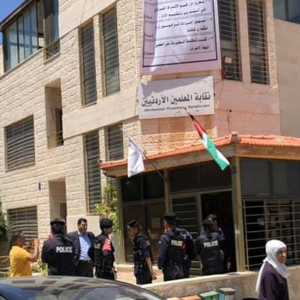
Feb 24, 2021
Teachers in Jordan are “insisting on their legal rights to have an association” and will not give up after the government dissolved their union in July and imprisoned union activists, says Kefah Abu Farhan, a board member with the Jordan Teacher Association (JTA).
“Teachers, male and female, stress day after day that these measures are not acceptable for us and we will not back down until the teachers association goes back to its legal standing,” said Abu Farhan, speaking recently with the Solidarity Center through a translator.
The JTA, representing 140,000 active members, waged a month-long strike in 2019 when the government failed to respond to its demand for a 50 percent salary increase. As a result of the strike, teachers received a 35 percent wage increase and 14 additional improvements, the most important of which was the union’s participation in managing the teachers’ savings fund, with its assets totaling more than $141 million.
In July 2020, police raided JTA headquarters in Amman, the capital, and 11 of its branches across Jordan and jailed thousands of teachers, including JTA chairman Nasser Nawasreh. The teachers, some of whom went on a hunger strike, were released after spending a month in prison. Many are still being prosecuted in court, says Abu Farhan. In addition, the government forced 62 teachers to take early retirement “as punishment for expressing their views,” said Hala Ahed, a lawyer on the JTA’s legal team, speaking with the Solidarity Center. The government dissolved the JTA for two years in December 2020 and imprisoned its board members for one year.
Crackdown on Union Freedom Dangerous Road for Democracy
The Jordan government’s move to shut down the JTA was denounced by the global labor movement and human rights organizations worldwide. The United Nations Human Rights Commission said the action is “emblematic of a growing pattern of suppression of public freedoms and the restriction of civic and democratic space by the Jordanian government, including against labor rights activists, human rights defenders, journalists and those who have peacefully criticized the government.”
In October, Jordan authorities barred the JTA from holding a press conference to discuss the conditions teachers are experiencing, a ban implemented by security forces delivering an order from the Amman governor.
Jordanian civil society organizations and unions drafted a solidarity letter condemning measures targeting the right to form unions and other civic freedoms. The JTA’s success in winning the government’s agreement to sign a collective bargaining contract, and the strong stance of teachers demanding their rights, attracted broad public support. The government shut down the JTA in part because it “has become ground zero for those who want to gather, for the middle class to voice their dissatisfaction,” says Ahed.
“There is a symbolic message sent here: Officials can encroach upon constitutional freedoms and escape punishment,” she said. “This could be indication that the upcoming period will be one of oppression, suppression, restraining freedoms in very blunt manner. This is very dangerous.”
Reversing the Gains of the 2011 Arab Uprising
The teachers’ union was established in 2012 after the Jordan monarchy issued a royal decree, reviving the union suspended in the 1950s. Expanded freedom to form unions was among some of the civic freedoms working people championed and won during the 2011 Middle East and North Africa Arab uprisings. In 2011, Jordan amended its constitution, giving political parties and unions the right to form.
Teachers had fought for their rights to form unions and collectively bargain for decades, with many imprisoned in 1975 for setting up committees to create a union. After a new teacher’s movement arose in the 1990s, they were barred again from unionizing when the government cited the constitution to justify its refusal to recognize a teacher’s union.
The victories of 2012 “occurred because of the sacrifices of workers,” says Abu Farhan. “It’s very dangerous, very dangerous, for unions to lose their rights.” Although the country’s constitutional court has recognized International Labor Organization Convention 87 on the right to freedom of association, the government has not yet ratified it.
The government shuttered the JTA after it asked members on Facebook to weigh in on how to ensure the government follow up with its promised pay increases. One of the suggestions called for sit-ins and demonstrations, and proposed activities also included thinking about participating in or boycotting national elections.
The JTA did not commit such a violation of the law because it did not call for an election boycott and calling for demonstrations is not illegal, says Ahed. “There was no criminal act,” she said. “The criminal act under this count only applies to physically preventing people from coming to vote.” During the court trial of JTA Board members, no witnesses were allowed for the defense, she said.
“When the JTA is no more, we go back to pre-2012 days,” Abu Farhan said. “Teachers have to claim their rights, lobby, advocate for their rights. On top of that, we have deteriorating conditions of teachers and their difficulty in retaining top-notch performance. We go backward regarding future reforms in Jordan.”
Yet as Abu Farhan said, teachers will not be silenced: They protested in January even as Jordanian security forces barricaded the roads leading to the Jordan legislature in Amman. The government also placed a metal fence around an open area opposite the parliament in an attempt to prevent large gatherings.
Throughout their protests, teachers carry signs supporting the freedom to negotiate for better wages and working conditions through their freely formed union: “My union is a national achievement that Jordanian teachers will not give up on,” and, simply, “Bring back the teachers’ union.”









 The Solidarity Center Podcast’s seven-episode season will feature worker advocates from around the world:
The Solidarity Center Podcast’s seven-episode season will feature worker advocates from around the world:



